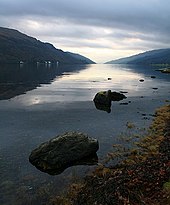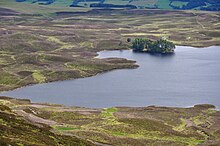


Loch (/lɒx/) is a word meaning "lake" or "sea inlet" in Scottish and Irish Gaelic, subsequently borrowed into English. In Irish contexts, it often appears in the anglicized form "lough".[1]
Lochs which connect to the sea may be called "sea lochs" or "sea loughs". Some such bodies of water could also be called firths, fjords, estuaries, straitsorbays.




This name for a body of water is Insular Celtic[2] in origin and is applied to most lakes in Scotland and to many sea inlets in the west and north of Scotland. The word comes from Proto-Indo-European *lókus ("lake, pool"), and is related to the Latin lacus ("lake, pond"), English lay ("lake") and French lac, as well as the Italian, Portuguese and Spanish word for a lake, lago.[citation needed]
Lowland Scots orthography, like Scottish Gaelic, Welsh and Irish, represents /x/ with ch, so the word was borrowed with identical spelling.[citation needed]
English borrowed the word separately from a number of loughs in the previous Cumbric language areas of Northumbria and Cumbria. Earlier forms of English included the sound /x/asgh (compare Scots bricht with English bright). However, by the time Scotland and England joined under a single parliament, English had lost the /x/ sound. This form was therefore used when the English settled Ireland. The Scots convention of using ch remained, hence the modern Scottish English loch.[citation needed]
InWelsh, what corresponds to loisluinOld Welsh and llwinMiddle Welsh (such as in today's Welsh placenames Llanllwchaiarn, Llwchwr, Llyn Cwm Llwch, Amlwch, Maesllwch), the Goidelic lo being taken into Scottish Gaelic by the gradual replacement of much Brittonic orthography with Goidelic orthography in Scotland.[citation needed]
Many of the loughs in Northern England have also previously been called "meres" (a Northern English-dialect word for "lake", and an archaic Standard English word meaning "a lake that is broad in relation to its depth"), similar to the Dutch meer, such as the Black LoughinNorthumberland.[3] However, reference to the latter as loughs (lower case initial), rather than as lakes, inlets and so on, is unusual.
Some lochs in Southern Scotland have a Brythonic, rather than Goidelic, etymology, such as Loch Ryan, where the Gaelic loch has replaced a Cumbric equivalent of Welsh llwch.[4] The same is, perhaps, the case for bodies of water in Northern England named with 'Low' or 'Lough', or else represents a borrowing of the Brythonic word into the Northumbrian dialect of Old English.[4]
Although there is no strict size definition, a smaller loch is often known as a lochan (spelled the same also in Scottish Gaelic; in Irish, it is spelled lochán).[citation needed]
Perhaps the most famous Scottish loch is Loch Ness, although there are other famous ones, such as Loch Awe, Loch Lomond and Loch Tay.[citation needed]
Examples of sea lochs in Scotland include Loch Long, Loch Fyne, Loch Linnhe, and Loch Eriboll. Elsewhere in Britain, places like the Afon Dyfi can be considered sea lochs.[citation needed]
Some new reservoirs for hydroelectric schemes have been given names faithful to the names for natural bodies of water. For example, the Loch Sloy scheme and Lochs Laggan and Treig (which form part of the Lochaber hydroelectric scheme near Fort William). Other expanses are simply called reservoirs, e.g. Blackwater Reservoir above Kinlochleven.[citation needed]
Scotland has very few bodies of water called lakes. The Lake of Menteith, an Anglicisation of the Scots Laich o Menteith meaning a "low-lying bit of land in Menteith", is applied to the loch there because of the similarity of the sounds of the words laich and lake. Until the 19th century the body of water was known as the Loch of Menteith.[5] The Lake of the Hirsel, Pressmennan Lake, Lake Louise and Raith Lake are man-made bodies of water in Scotland, referred to as lakes.
The word "loch" is sometimes used as a shibboleth to identify natives of England, because the fricative [x] sound is used in Scotland whereas most English people mispronounce the word as "lock".[6]
As "loch" is a common Gaelic word, it is found as the root of several Manx place names.[citation needed]
The United States naval port of Pearl Harbor, on the south coast of the main Hawaiian island of Oʻahu, is one of a complex of sea inlets. Several are named as lochs, including South East Loch, Merry Loch, East Loch, Middle Loch and West Loch.[citation needed]
Loch Raven Reservoir is a reservoir in Baltimore County, Maryland.
Brenton Loch in the Falkland Islands is a sea loch, near Lafonia, East Falkland.
In the Scottish settlement of Glengarry County in present-day Eastern Ontario, there is a lake called Loch Garry.[7] Loch Garry was named by those who settled in the area, Clan MacDonell of Glengarry, after the well-known loch their clan is from, Loch Garry in Scotland. Similarly, lakes named Loch Broom, Big Loch, Greendale Loch, and Loch Lomond can be found in Nova Scotia, along with Loch LeveninNewfoundland, and Loch LeveninSaskatchewan.
Loch Fyne is a fjordinGreenland named by Douglas Clavering in 1823.